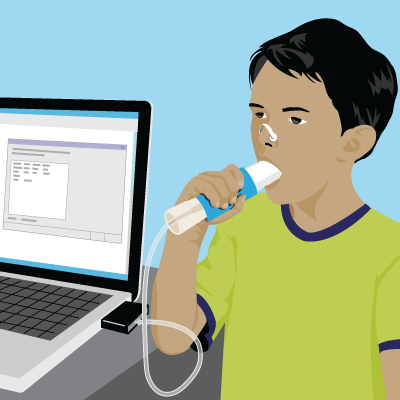Spirometry
Article Translations: (Spanish)
What Is Spirometry?
Spirometry is a quick, painless test using a tool called a spirometer to measure how much air a person's lungs can hold. It also tests the speed of inhalations (breathing in) and exhalations (breathing out).
This test is given to children older than 5 years.
The spirometer has two pieces:
- a mouthpiece
- a tube that connects to a machine that records and displays the results
Why Is Spirometry Done?
Spirometry tells health care professionals how well the lungs are working. It's used to help diagnose and monitor diseases that affect the lungs and make breathing difficult, such as asthma and cystic fibrosis.
It also can be used to:
- find the cause of shortness of breath, coughing, or wheezing
- check treatment of respiratory problems
- check lung function before surgery
How Should We Prepare for Spirometry?
You can help prepare your child for spirometry by explaining the importance of following the instructions of the person giving the test.
Before the test, your child should avoid cold medicines, caffeine, carbonated beverages, and exposure to tobacco smoke. Your child also shouldn't eat a big meal before the test.
The doctor might have your child stop taking any regular medicines for a bit before the test. Your child may be asked to practice for the test, such as by pretending to blow out birthday candles or blowing air at a pinwheel.
On the day of the test, make sure that your child doesn't wear tight clothing that could interfere with being able to breathe in and out deeply.
What Happens During Spirometry?
Depending on the doctor's recommendations, your child might wear soft nose clips to prevent air from escaping. Your child also may be asked to stand during the test. If seated, your child should not lean forward because this can affect breathing.
Your child will take a very deep breath, place the device in the mouth with the lips sealed securely around the mouthpiece, and then exhale as fast and hard as possible for as long as possible. The test may be repeated several times to confirm the results.

Spirometry is often done before and after a patient is given an inhaled medicine called a bronchodilator, which opens up the airways. This can help determine whether a lung problem can be treated with certain medicines.
Spirometry usually takes 5–30 minutes, depending on the number of times the test is done.
When Are the Results Ready?
The results are recorded while the test is being done, and some machines are programmed to review results and suggest interpretations. However, your doctor also will review the results and tell you what they mean.
Are There Any Risks From Spirometry?
Spirometry is considered a safe procedure with little risk. Because the test requires kids to breathe quickly and deeply, some may have temporary shortness of breath or lightheadedness. This test shouldn't be done on kids who have chest pain, a recent history of eye or abdominal surgery, or serious heart disease.
What If I Still Have Questions?
If you have questions or concerns about spirometry, speak with your doctor or the person giving the test.
Note: All information is for educational purposes only. For specific medical advice, diagnoses, and treatment, consult your doctor.
© 1995-2024 KidsHealth ® All rights reserved. Images provided by iStock, Getty Images, Corbis, Veer, Science Photo Library, Science Source Images, Shutterstock, and Clipart.com

